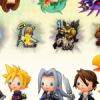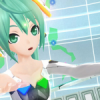Theatrhythm Final Fantasy: Curtain Call was recently confirmed by publisher Square Enix for North American release later this year, but no specific date was given. In the meantime, we’ve spent some time with the import version of the Final Fantasy-themed music-and-rhythm sequel to see how the new features play out.
We’ve spent 7 hours with the game so far and can report that whilst the core gameplay of tapping and sliding to Final Fantasy tunes is unaltered, Curtain Call is more user-friendly and generous with handing out new content than its predecessor.
In fact, it took us just 20 minutes to get access to over 200 songs. As with the original game, these songs come in 3 flavors: the intense Battle Music stages (BMS), the relatively sedate Field Music stages (FMS) and Event Music Stages (EMS), which have more stringent timing requirements than other stage types. Unlike BMS and FMS - which are available almost immediately - EMS require the player to clear Rhythmia thresholds before they unlock.
Every time you clear a song your Rhythmia total will increase slightly. Unlocks are dished out each time the cumulative Rhythmia count rises by 500. These unlocks include the aforementioned EMS songs, new sound effects for input effect customization, Crystal Shards and Collector Cards.
Collector Cards raise the stats of unlocked characters – giving them a slight boost over simply leveling up. As with Crystal Shards, these cards are Rhythmia-quota bonuses or dropped as loot during songs. The cards are adorned with images of heroes, villains and monsters from across the Final Fantasy franchise and come in three rarity bands: Normal, Rare and Premium.
To use them you’ll have to visit the “Collecta Crystarium” which can be accessed from the Party Edit tab in the game’s menu. Here, you’ll be able to increase your characters’ power with up to 8 cards at a time. Each card confers a specific stat increase to the target character. For example, applying the Kefka card might raise the target characters’ Magic by 5.
We say “might” because each card also comes with a Success Rate and Critical Hit Rate statistic. A high Success Rate is important as cards that miss have their stat contribution reduced, conversely a high Critical Rate is important as cards that apply critically have their stat contribution increased.
Players can tip the odds in their favor by using like cards; characters from the same game or of the same class (summon, character, monster etc). Doing so increases the Success Rate Correction and Critical Hit Rate Correction stats, the value of which stacks on top of the cards’ Success Rate and Critical Hit Rate stats.
We’ve yet to see if powering up characters will have a major impact on clearing the harder songs, but either way the RPG elements of the game - including equipping items and skills - look to be a major part of the new addition to Curtain Call: Quest Medley mode.
Quest Medley mode plays out like a mini-RPG, where players are tasked with crossing through points on a map to reach and defeat the end-map boss. Each point on the map is a BMS or FMS song which must be cleared to proceed to the next point. The player is privy to the stage type and which game the upcoming song is sourced from, but the specific song title remains a secret until they jump into the stage.
It sounds simple enough then, but there’s a catch - the party HP meter carries over between songs and healing spells only work at half efficiency.
Fortunately, the player can use Potions and Tents between songs to keep their HP levels up. Periodically they’ll pass through an “Ether light”: a checkpoint that the player will be warped back to if they fail a song, albeit keeping any XP or items they might have gained since passing through it.
Quests come in short, medium and long varieties. The longer the quest the more inventory stocks will be depleted as you try to keep characters healed, but this is compensated by greater XP gain. This is because in Quest Medley mode time and XP gain are linked. Clear a stage or use a Tent and one day of in-game time will pass. For every three days that pass the XP multiplier increases by an increment of between 0.1-0.3x. Quest Medley mode might turn out to be the optimum way to level characters in Curtain Call.
The player can quit out of, and later pick up their quest but they can only keep three quests (one short, one medium and one long) active at a time. So, if the player wants to engage a new long quest and they already have a long quest in play, they’ll have to cancel their current long quest progress.
Interestingly Quest Maps offer branching paths. Different paths have different BMS/ FMS ratios and different rewards (Crystal Shards, keys) attached to them, and some are simply impassable, locked behind colored doors. These doors can be opened by using a key of the corresponding color (red, yellow, blue or purple) but so far playing songs has only netted us blue keys for red doors. We did notice however, that these keys carry over between Quest Maps.
The song difficulty on Quest Medley maps curves upwards mildly, the first few starting the player off on the Basic difficulty mode. From what we can tell, song difficulty within any given map is set at a consistent difficulty setting. For the moment at least, Quest Medley mode is very easy; the game has only just started employing Expert (medium) difficulty setting maps and healing items are an unneeded extravagance. For those that want a challenge straight away, the standard Music Select mode offers Basic, Expert and Ultimate difficulty settings for each song from the get go.
Finding and jumping directly into a song in Music Select mode is faster than ever thanks to the favorite system; tick the heart icon near any song name and a shortcut icon will be added to the file load screen, allowing the player one-touch access to a song of their choice. All without having to hunt it down through menus or even load their game. Alternatively, you can register a Quest Map to the shortcut icon.
If you do try and hunt a song down, you can hit the Start button to bring up filter options. Songs can be filtered alphabetically, by game title or stage type. If it’s not finding a song that you’re having trouble with but picking one, hitting the x button will highlight a song at random for you.
Lastly, Curtain Call gives players the choice of button, as well as the stylus input from the original Theatrhythm. Tapping the touch screen is replaced with pressing the 3DS’s shoulder or face buttons, whilst drag, hold and flicking motions are replicated with the analog-nub. We found that on faster songs the analog nub wasn’t nimble enough to keep pace with the torrent of directional arrows screen prompts.
We’ve only put 7 hours into Theatrhythm Final Fantasy: Curtain Call so far, yet we already have access to 226 songs (not counting DLC) and 29 of the promised 60 characters. At the moment Quest Medley mode is compelling, but its level of challenge is tame. We’ll be putting plenty more time into Curtain Call, so check back with us soon for our final review.









